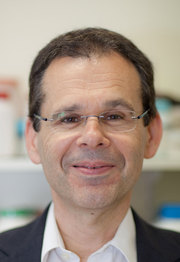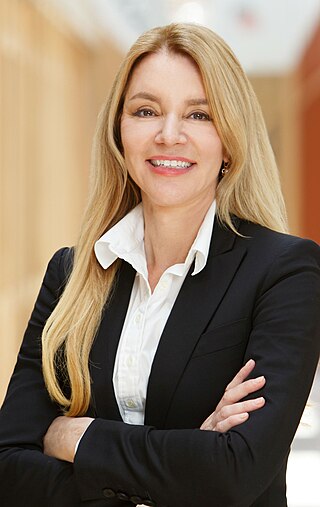Related Research Articles

Sir James Fraser Stoddart is a British-American chemist who is Board of Trustees Professor of Chemistry and head of the Stoddart Mechanostereochemistry Group in the Department of Chemistry at Northwestern University in the United States. He works in the area of supramolecular chemistry and nanotechnology. Stoddart has developed highly efficient syntheses of mechanically-interlocked molecular architectures such as molecular Borromean rings,catenanes and rotaxanes utilising molecular recognition and molecular self-assembly processes. He has demonstrated that these topologies can be employed as molecular switches. His group has even applied these structures in the fabrication of nanoelectronic devices and nanoelectromechanical systems (NEMS). His efforts have been recognized by numerous awards including the 2007 King Faisal International Prize in Science. He shared the Nobel Prize in Chemistry together with Ben Feringa and Jean-Pierre Sauvage in 2016 for the design and synthesis of molecular machines.
Alice Yen-Ping Ting is Taiwanese-born American chemist. She is a professor of Genetics,of Biology,and by courtesy,of Chemistry at Stanford University. She is also a Chan Zuckerberg Biohub investigator and a member of the National Academy of Sciences.
Catherine "Cathy" J. Murphy is an American chemist and materials scientist,and is the Larry Faulkner Professor of Chemistry at the University of Illinois at Urbana-Champaign (UIUC). The first woman to serve as the Head of the Department of Chemistry at UIUC,Murphy is known for her work on nanomaterials,specifically the seed-mediated synthesis of gold nanorods of controlled aspect ratio. She is a member of the American Association for the Advancement of Science,National Academy of Sciences,and the American Academy of Arts and Sciences in 2019.

Ravi V. Bellamkonda is an Indian-American biomedical engineer and academic administrator. Since 2021,he has served as Provost and Executive Vice President for Academic Affairs at Emory University in Atlanta,Georgia. Bellamkonda was previously Vinik Dean of the Pratt School of Engineering at Duke University.
Samuel Achilefu is a Nigerian-born scientist and medical researcher who has pioneered both fundamental and applied research in science,engineering,and medicine. Dr. Samuel Achilefu is the Michel M. Ter-Pogossian Professor of Radiology and Vice Chair for Innovation and Entrepreneurship at the Mallinckrodt Institute of Radiology,Washington University School of Medicine. He holds joint appointments as a professor of medicine,biochemistry and molecular biophysics,and biomedical engineering. He currently serves as the Director of the Washington University Molecular Imaging Center and the privately funded Theranostic Innovation Program. He is co-director of the Center for Multiple Myeloma Nanotherapy and co-Leader of the Oncologic Imaging Program of the Alvin J. Siteman Cancer Center at Washington University.

Anthony Steven Weiss AM PhD FRSC FTSE FRSN FRACI,FTERM,FBSE is a university researcher,company founder and entrepreneur. He is the leading scientist in human tropoelastin research and synthetic human elastin. He holds the McCaughey Chair in Biochemistry,heads the Charles Perkins Centre Node in Tissue Engineering and Regenerative Medicine,and is Professor of Biochemistry and Molecular Biotechnology at the University of Sydney. His discoveries are on human elastic materials that accelerate the healing and repair of arteries,skin and 3D human tissue components. He is a Fellow of the Royal Society of Chemistry. Weiss is on the editorial boards of the American Chemical Society Biomaterials Science and Engineering,Applied Materials Today (Elsevier),Biomaterials,Biomedical Materials,BioNanoScience (Springer) and Tissue Engineering. He is a biotechnology company founder,promoter of national and international technology development,and has received national and international awards,including the Order of Australia.

Valerie Sheares Ashby is a chemist and university professor who currently serves as President of the University of Maryland,Baltimore County. She was the Dean of Trinity College of Arts and Sciences at Duke University from 2015 to 2022 and formerly chair of the chemistry department at the University of North Carolina at Chapel Hill from 2012 to 2015. With her research group,she holds ten patents. On April 4,2022,it was announced that Ashby would assume the position of president of the University of Maryland,Baltimore County.

Malika Jeffries-EL is an American chemist and associate professor of chemistry at Boston University studying organic semiconductors. Specifically,her research focuses on developing organic semiconductors that take advantage of the processing power of polymers and the electronic properties of semiconductors to create innovative electronic devices. She was elected as a Fellow of the American Chemical Society in 2018.
Livia Schiavinato Eberlin is a Brazilian analytical chemist who won a MacArthur "Genius" Fellowship for her research on the use of mass spectrometry to detect cancerous tissue.
Eilaf Egap is an assistant professor of Materials Science at Rice University. She works on imaging techniques and biomaterials for early diagnostics and drug delivery. She was a Massachusetts Institute of Technology MLK Visiting Scholar in 2011.

Andrea Martin Armani is the Ray Irani Chair in Engineering and Materials Science and Professor of Chemical Engineering and Materials Science at the USC Viterbi School of Engineering. She was awarded the 2010 Presidential Early Career Award for Scientists and Engineers from Barack Obama and is a World Economic Forum Young Global Leader.

Eva M. Harth FRSC is a German-American polymer scientist and researcher,and a fellow of both the Royal Society of Chemistry and the American Chemical Society. She is a full professor at the University of Houston and director of the Welch Center for Excellence in Polymer Chemistry.
Susmita Bose is an Indian-American scientist and engineer,best known for her research on biomaterials,3D printing or additive manufacturing of bone implants and natural medicine. She is the Herman and Brita Lindholm Endowed Chair Professor in the School of Mechanical and Materials Engineering at Washington State University.

Debra Auguste is an American chemical engineer and professor at Northeastern University in the Department of Chemical Engineering. Auguste is dedicated to developing treatments for triple negative breast cancer,one of the most aggressive and fatal cancers that disproportionately affects African American women. Her lab characterizes biomarkers of triple negative breast cancer and develops novel biocompatible therapeutic technologies to target and destroy metastatic cancer cells. Auguste received the 2012 Presidential Early Career Award for Scientists and Engineers and in 2010 was named in the 50 Most Influential African-Americans in Technology. In 2020,Auguste became an Elected Fellow of the American Institute for Medical and Biological Engineering.
Nicola Lucia B. Pohl is an American chemist who is the Joan &Marvin Carmack Chair at Indiana University Bloomington. She also serves as Associate Dean of Natural and Mathematical Sciences. Her research considers new approaches to make and analyse sugars. In 2020 she was elected a Fellow of the American Association for the Advancement of Science.
Jennifer L. West is an American bioengineer. She is the current Dean of Engineering and Applied Science at the University of Virginia. She was the Fitzpatrick University Professor of Biomedical Engineering at Duke University from 2012-2021. In 2000,West cofounded Nanospectra Biosciences in Houston to develop a cancer therapy based on gold nanoparticles that destroy tumor cells and has been listed by MIT Technology Review as one of the 100 most innovative young scientists and engineers world wide.
Shelly R. Peyton is an American chemist who is the Armstrong Professional Development Professor at the University of Massachusetts Amherst. Her research considers the development of biomaterials to investigate metastatic cancer and potential new therapies.
Elizabeth Cosgriff-Hernandez is an American biomedical engineer who is a professor at the University of Texas at Austin. Her work involves the development of polymeric biomaterials for medical devices and tissue regeneration. She also serves on the scientific advisory board of ECM Biosurgery and as a consultant to several companies on biostability evaluation of medical devices. Cosgriff-Hernandez is an associate editor of the Journal of Materials Chemistry B and Fellow of the International Union of Societies for Biomaterials Science and Engineering,Biomedical Engineering Society,Royal Society of Chemistry,and the American Institute for Medical and Biological Engineering.
Helen Haiyan Lu is a Chinese American biomedical engineer and the Percy K. and Vida L. W. Hudson professor of biomedical engineering at the Columbia University Fu Foundation School of Engineering and Applied Science. Her work focuses on understanding and developing therapies in complex tissue systems,especially the interface between soft tissue and bone.
Deborah E. Leckband is an American chemist who is the Reid T. Milner Professor of Chemical Sciences and professor of chemistry at the University of Illinois Urbana-Champaign. She works on biomaterials,tissue engineering and the nano mechanics of biomolecules. She is a Fellow of the American Institute for Medical and Biological Engineering,the American Association for the Advancement of Science,the Biomedical Engineering Society and the American Chemical Society.
References
- ↑ "CASSANDRA L. FRASER". chemistry.as.virginia.edu. Retrieved May 14, 2021.
- 1 2 "Cassandra L. Fraser". radcliffe.harvard.edu. Radcliffe Institute for Advanced Study . Retrieved May 14, 2021.
- ↑ "The Presidential Early Career Award for Scientists and Engineers: Recipient Details". nsf.gov. Retrieved May 14, 2021.
- ↑ Estabrook, Morgan (December 16, 2008). "INVENTOR PROFILE: ENHANCING BIOMEDICAL IMAGING THROUGH SUSTAINABLE DESIGN". news.virginia.edu. Retrieved May 14, 2021.
- ↑ "COLLABORATIVE RESEARCH HOLDS PROMISE FOR BIOMEDICAL APPLICATIONS". news.virginia.edu. July 8, 2009. Retrieved May 14, 2021.
- ↑ "NEW LIGHT-EMITTING BIOMATERIAL COULD IMPROVE TUMOR IMAGING, STUDY SHOWS". news.virginia.edu. August 11, 2009. Retrieved May 14, 2021.
- ↑ Samarrai, Fariss (February 15, 2010). "CHEMISTS DISCOVER LIGHT-EMITTING COMPOUND, CREATE COLLABORATIONS". news.virginia.edu. Retrieved May 14, 2021.
- ↑ Bromley, Anne E. (August 25, 2011). "MASTER TEACHERS CALLED TO SPREAD THEIR EXPERTISE ON GROUNDS". news.virginia.edu. Retrieved May 14, 2021.
- ↑ Bromely, Anne E. (December 21, 2015). "THREE UVA SCIENTISTS ELECTED AAAS FELLOWS". news.virginia.edu. Retrieved May 14, 2021.
- ↑ Heuchert, Dan (April 12, 2017). "NEW NATIONAL RANKINGS, JEFFERSON SCHOLARS HONOR FACULTY MEMBERS". news.virginia.edu. Retrieved May 14, 2021.